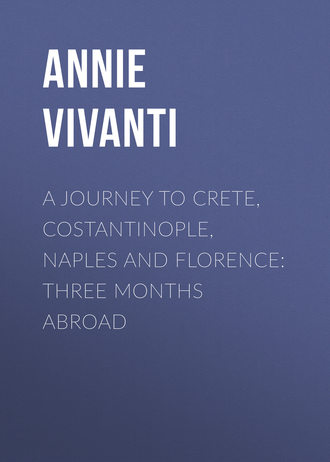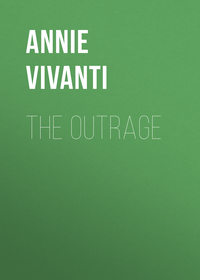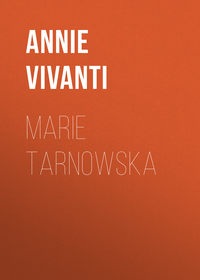 полная версия
полная версияA Journey to Crete, Costantinople, Naples and Florence: Three Months Abroad
The poor girl had slipped off her horse with saddle and all, at a most dangerous spot in going to the Dead Sea; she might have been seriously injured, as she could not extricate herself at once, and the horse was moving on. Fortunately the young Kentuckian, who, as I had observed on the steamboat, was always trying to be near that “nice German girl,” was close behind her. He jumped from his horse and caught hold of hers, so that she was able to get up, having sustained no great injury beyond the fright. She feelingly remarked, that fortunately her papa was far behind. He only heard of the accident, when the saddle and the young lady were safe again on the back of the steed. The poor man had been out of his saddle more than once, but without other injury than a sprain of his foot, which obliged him to lie down for a few days, and hurt him for many more.
Poor M. L—, a professor from Prague, did not escape so easily. In one of his falls he managed so badly that he hurt his leg seriously. Inflammation set in, and he had forty leeches applied to it. But what might have been the worst of all accidents, happened to Mme. de H—, the sister of the Archbishop. Horse and lady fell down together, and turned over and over before either got up again. The fair rider however escaped unhurt. I was sorry that there was no time for Mdlle. S. to tell me of all the accidents that befell these unlucky excursionists, for every one met with some mishap, either in Palestine or Egypt, with the exception of the four young Americans and old General T—. The latter seemed as much at home in Jerusalem and Cairo, as he had been on board the Neptune. He always ate with a tremendous appetite whatever the fare might be, and slept like a bear on whatever couch he rested.
The guard, who called out that the train for Milan was going to start, interrupted our conversation. Mdlle. S— took up a little box, which she had set down near her, and which contained a small tortoise, which poked its head through a hole in the lid. This and a shell, which she wore as a sign of her pilgrimage on her little hat, was, as far as I could see, all she had to recompense her for the endless troubles and fatigues of her journey.
And now I will hasten to conclude mine; for after we left Florence the journey no longer offered any great attractions. The places I saw now, I had already seen before, nor could they vie with those I had so lately visited. Now I was with heart and soul already in England, at home with my children. Oh, how slowly the express train travels! How long is a night in a railway carriage! Shall we rest a day at Paris? No, I am not tired. I cross the Channel as in a dream. There are the white cliffs of Dover, I am in old England! Fly away train, rush along, take me home, home!
At last the train stops, a few minutes bring me to our garden gate. I fly through the garden, the door opens. Yes, there they are all, and all well! My baby climbs up a chair, and clings round my neck; the boys make a deafening noise, and I believe the mamma is almost as noisy.
And now I leave them, though for a few minutes only. I sit down in my own room, on my own chair, and all at once I feel I am tired. I shut my eyes, out of which tears steal, and my full heart thanks Him, who gave me the joys of the journey, who brought me safely home to my children and who watched over them, and preserved them while I was away.
THE END1
16° Reaumur equal to 36° of Fahrenheit.
2
22½ F.
3
Seraglio means a palace. Harem means sacred, and is that part of the Seraglio which is assigned to the women.
4
“Oranges, lemons, pomegranates, and all other fruits, are produced in the greatest abundance, and sold at the vilest prices. The gardens are rich and beautiful, and adorned with many plants unknown in other countries.”—History of Candia, published in 1550.
5
The Turks count their hours from sunset, which is always 12 o’clock; when the next day begins.
6
It is with great diffidence that I print this chapter, as I am conscious that so short a stay in a place so strange, and to strangers, in part so little accessible as Constantinople, could not enable me to form any competent judgment of the people that inhabit it. I intended, therefore, to confine myself merely to a description of their outward appearance and manners without drawing any conclusions or forming any judgment. I find, however, that I have not been able to keep my good intention. May the reader take these remarks for what they are worth, and pardon the errors into which I have surely fallen.
7
Thy glory will end, when the human race shall have ceased to see the sun, and to inhabit the earth.
8
You that walk in the path of love, cast a look upon these walls, where in April 1266, was born Beatrice Portinari, etc.
9
You taught me how a man becomes immortal.
10
Rome, that turned once the world to goodWas wont to boast two suns, whose several beamsCast light in either way; the world’s and God’s.One since has quenched the other, and the swordIs grafted on the crook; and so conjoinedEach must perforce decline to worse, unawedBy fear of other.Cary’s translation.11
The Church of Rome,Mixing two governments that ill assort,Hath missed her footing, fallen into the mire,And there herself and burden much defiled.12
Ah Constantine! to how much ill gave birth,Not thy conversion, but that plentous dower,Which the first wealthy Father gained from thee.Cary’s Dante.13
No purpose was of oursThat on the right hand of our successors,Part of the Christian people should be set,And part upon their left; nor that the keys,Which were vouchsafed me, should for ensign serveUnto the banners, that do levy warOn the baptized.14
Supreme of gifts which God, creating, gaveOf his free bounty, sign most evidentOf goodness, and in his account most prized,Was liberty of will, the boon wherewithAll intellectual creatures, and them sole,He hath endowed.15
Let us honour the sublime Poet, his great soul is appeased.
16
“I was brought here to honour the triumph of him whom I sent into exile.”




